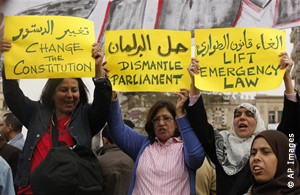The term “civil society” can seem almost as amorphous as the term “social media.” Yet the two are becoming ever more powerfully linked to the promotion of democracy and human rights in the modern world.
Civil society can encompass any collection of nongovernmental activists, organizations, congregations, writers and/or reporters. They bring a broad range of opinions to the marketplace of ideas and are considered critical to a vibrant, well-functioning democracy. Secretary of State Hillary Rodham Clinton has described a free civil society as the third critical element to democracy – the other two being a representative government and a well-functioning market.
Social media consists of forms of electronic communication – typically using Internet- and mobile-based tools – which allow the creation of online communities to share information and ideas.

Pakistani University students use their mobile phones to record video of a protest condemning the killing of the governor of Punjab.
Civil society increasingly relies on social media because it is accessible, fast, efficient and easy to use. Seeing how social media can buttress civil society, the Obama administration launched an initiative back in 2009 to help grassroots organizations around the world master and effectively use digital technology.
In some countries with repressive governments that control traditional print, radio and televised media, social media may be the only access people have to unfettered discussions of issues. Philip Howard, an associate professor and author of the soon-to-be released book called “The Digital Origins of Dictatorship and Democracy,” says that for civil society in the 21st century, social media creates “a digital ‘safe harbor’ in which conversations can incubate.”
“Information infrastructure is politics,” Howard says. “In many nations, it also is far more participatory than the prevailing traditional political culture. As a result, the new technology-based politics democratizes the old, elite-driven arrangements. Every time a citizen documents a human rights abuse with her mobile phone, uses a shared spreadsheet to track state expenditures, or pools information about official corruption, she strengthens civil society and strikes a blow for democracy.”
Social media, of course, is a double-edged sword: it can be used for good as well as for ill. The question is: Will the good uses outweigh the bad? What do you think?


 What do you do when officials in your country are limiting freedom of speech, but you have a message to distribute to the world? That’s a question some Egyptians have been dealing with as they demonstrate in the streets and call for economic and political reforms. The answer for many has been to create new paths of communication using old technologies.
What do you do when officials in your country are limiting freedom of speech, but you have a message to distribute to the world? That’s a question some Egyptians have been dealing with as they demonstrate in the streets and call for economic and political reforms. The answer for many has been to create new paths of communication using old technologies. 





